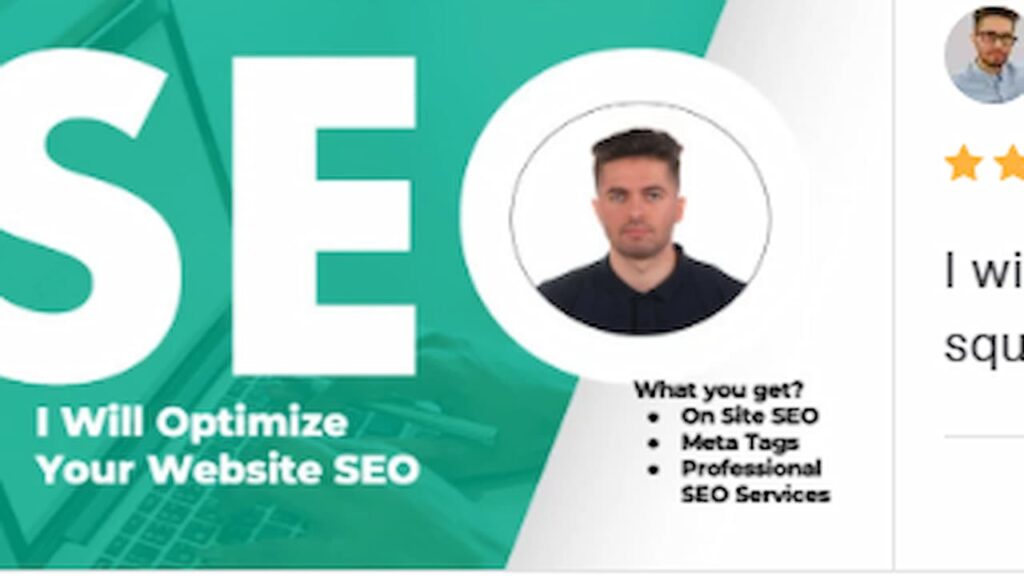On-Page SEO (Search Engine Optimization) is a crucial element of digital marketing that involves optimizing individual web pages to rank higher and earn more relevant traffic in search engines like Google. On-page optimization aims to improve the relevance and quality of the content on a website to make it more appealing to search engines and users. It involves optimizing various aspects of a webpage, including its content, HTML structure, and metadata, to make it more search engine friendly and user-friendly. On-Page SEO can have a significant impact on a website’s search engine rankings and overall digital marketing success.
1 – Optimize website SEO on WordPress, Shopify, Wix, Squarespace by Orialmehmeti
Using my expertise in white hat SEO techniques developed over the past 8 years and having worked with over 5K websites, I will help your website become a strong competitor in search engines. I guarantee an improved SEO score, better search engine rankings, and overall improvement. My methods are always up to date with the latest Google algorithm updates and recommendations.
Our SEO packages include:
Basic Package: Includes basic SEO, meta description, title, H1, and H2 headings.
Standard Package: Includes everything in the Basic Package, plus an SEO report, sitemap and robot.txt setup, ALT text for images, bad link removal, and setup of Google Analytics 4.
Premium Package (Recommended): Includes everything in the Standard Package, plus setup and optimization of Google Search Console, web page crawling and fetching, Google Tag Manager connection, GA-4 optimization, data structure optimization, schema markup, broken links removal, social media connection and advice on how to use them, and advice for further optimizations.
I work with a variety of platforms, including WordPress, Shopify, Wix, Squarespace, Weebly, Magento, Joomla, HTML, and PHP websites. I offer a 100% money-back guarantee.
To set up Google Web Tools, Google Analytics 4, and Google Tag Manager, I require access to your platform login details and a Gmail account.
2 – Do complete seo of shopify ecommerce store to increase sales by Seo_wordpresss
My SEO services cover a wide range of tasks, including but not limited to:
- Setting up Google Tag Manager
- Optimizing meta tags, such as meta title and description
- Conducting keyword research
- Balancing keyword density
- Optimizing heading tags (H1, H2, H3, etc.)
- Setting up Google My Business
- Integrating Google Analytics and Search Console
- Integrating Webmaster Tools
- Optimizing image ALT tags
- Scaling images
- Optimizing internal and outbound links
- Optimizing SEO-friendly permalinks
- Submitting robots.txt
- Removing or redirecting broken links
- Creating an XML site map
- Installing and configuring Yoast plugin for WordPress SEO
- Installing and configuring schema markup
The platforms (CMS) I work with include Shopify, WordPress, Bigcommerce, Woocommerce, Wix, Joomla, Weebly, and Magento.
3 – Do wordpress yoast SEO on page with schema markup by Techhikers
Did you know that you can increase your organic traffic? Do you want to have the BEST ranking on search engines? Ready to make your business shine?
We provided guaranteed WordPress Yoast SEO & On Page Optimization, to improve your search engine visibility. It should be powerful to rank you higher in the SERPs of Google. Schema markup is one of the best futures for On Page.
We DO So By:
- Install & configure the Yoast plugin with a proper setting.
- Suitable Meta title, Meta description with organic Keyword Research
- Schema Markup
- Generate XML Sitemaps & Robots.txt
- Webmaster Tools (Bing, Yahoo) & Google analytics
- Fix duplicate content & stop words from URLs
- Pro Audit report, Backlinks & Competitors Analysis
4 – Optimize your wordpress site for SEO by Tolmergroup
Thanks for visiting my page. My name is Nicole, and I am a certified digital marketing specialist with a Bachelor’s degree in Communications, majoring in Marketing and Public Relations. Over the past 3 years, I have worked with businesses of all sizes and honed my skills to grow and market any business. My role is to customize my expertise to fit your business needs and achieve growth in the digital world.
5 – Do complete wix SEO optimization for google ranking by Smtouhid07
I am committed to completing the WiX SEO Checklist and achieving a 100% score with the correct settings. In addition, I will perform the following tasks:
✔ Conduct keyword research to identify the best possible key phrases. ✔ Perform competitor analysis if required. ✔ Optimize titles for maximum impact. ✔ Optimize image alt tags. ✔ Optimize meta descriptions. ✔ Optimize pages for better search engine visibility. ✔ Set up Google Analytics to track website traffic and user behavior. ✔ Set up Google Search Console and Bing Webmaster tools and optimize them. ✔ Submit sitemap to webmaster tools for better indexation. ✔ Submit your website to both search engines for better visibility. ✔ Guarantee indexation for your website. ✔ Optimize URLs for better SEO. ✔ Set up HTTPS for secure browsing. ✔ Fix broken links (404 errors). ✔ Address 301 redirection issues. ✔ Resolve title tag duplication issues. ✔ Provide off-page strategy suggestions. ✔ Offer bonus tips, future support, and more!
FAQs
What is on page & off page SEO optimization?
On-page SEO optimization refers to the practice of optimizing individual web pages in order to rank higher and earn more relevant traffic in search engines. This involves optimizing various on-page elements such as title tags, meta descriptions, header tags, content, images, internal linking, and URL structure to make them more search engine friendly.
Off-page SEO optimization, on the other hand, refers to the activities and strategies that are performed outside of your website in order to improve its search engine rankings. This includes tactics such as link building, social media marketing, influencer outreach, guest blogging, and brand mentions on external sites.
Both on-page and off-page optimization are essential components of any effective SEO strategy. On-page optimization helps ensure that your website is easily understandable by search engines, while off-page optimization helps establish your website’s authority and credibility in the eyes of search engines and potential customers.
What is on-page SEO?
On-page SEO, also known as on-site SEO, refers to the practice of optimizing individual web pages to rank higher and earn more relevant traffic in search engines. It involves optimizing various on-page elements such as title tags, meta descriptions, header tags, content, images, internal linking, and URL structure to make them more search engine friendly.
Some common on-page optimization techniques include:
Keyword research: Identifying and using relevant keywords in the content, headings, and meta tags of a page.
Content optimization: Creating high-quality, relevant, and engaging content that provides value to the user and is optimized for the target keywords.
Title tags and meta descriptions: Optimizing title tags and meta descriptions with relevant keywords and compelling copy that encourage clicks from search engine users.
Header tags: Using header tags (H1, H2, H3, etc.) to structure content and make it easier to read for both users and search engines.
Image optimization: Optimizing images with descriptive file names and alt text tags that include relevant keywords.
Internal linking: Linking to other pages within your website to provide additional context and improve the user experience.
By implementing these on-page optimization techniques, website owners can improve their website’s relevance and visibility to search engines, which can lead to higher rankings and more traffic from search engines.
What are the best techniques for off-page SEO?
There are many different techniques that can be used for off-page SEO, but some of the best and most effective ones include:
Link building: Building high-quality, relevant, and authoritative backlinks to your website from other reputable websites. This can be achieved through techniques such as guest posting, broken link building, and influencer outreach.
Social media marketing: Leveraging social media platforms to promote your brand, drive traffic to your website, and build relationships with potential customers.
Content marketing: Creating high-quality, valuable content that is designed to be shared and promoted on other websites and social media platforms.
Influencer outreach: Reaching out to influencers in your industry and building relationships with them to promote your brand and gain exposure to their audiences.
Online directories: List your business in relevant online directories to increase your visibility and improve your search engine rankings.
Brand mentions: Building your brand’s reputation and credibility by earning mentions on other websites and social media platforms.
These techniques can help improve your website’s authority, credibility, and visibility in search engines, which can lead to higher rankings, more traffic, and increased revenue for your business. However, it’s important to approach off-page SEO strategies ethically and avoid any tactics that could be seen as manipulative or spammy, as this can harm your website’s reputation and rankings in the long run.
What is Off-Page SEO?
Off-page SEO, also known as off-site SEO, refers to the various strategies and techniques that are used to improve the visibility and ranking of a website in search engine results pages (SERPs) through activities that take place outside of the website itself.
Off-page SEO primarily involves building high-quality backlinks from other relevant and authoritative websites to your own website. Backlinks serve as a vote of confidence in the quality and relevance of your website, and search engines use them to determine the authority and popularity of your website in relation to other websites in your industry.
Other off-page SEO techniques include:
Social media marketing: Using social media platforms such as Facebook, Twitter, and LinkedIn to promote your website, build brand awareness, and attract new visitors.
Influencer outreach: Building relationships with influencers in your industry and getting them to promote your brand or content to their audiences.
Content marketing: Creating high-quality, valuable content that is designed to be shared and promoted on other websites and social media platforms.
Online directories: Listing your business in relevant online directories to increase your visibility and improve your search engine rankings.
Brand mentions: Building your brand’s reputation and credibility by earning mentions on other websites and social media platforms.
Overall, off-page SEO plays a critical role in improving the search engine rankings and visibility of a website, and it requires a well-rounded and diverse approach to be effective. By implementing a variety of off-page SEO techniques, website owners can improve their website’s authority, credibility, and visibility in search engines, which can lead to higher rankings, more traffic, and increased revenue.
Final thought
On-Page SEO is a critical component of any successful digital marketing campaign. By optimizing individual web pages, businesses can improve their online visibility, attract more traffic, and generate more leads and conversions. It is essential to regularly audit and optimize on-page elements to ensure that the website is up to date with the latest best practices and algorithms. While it may seem like a lot of work, the benefits of On-Page SEO are well worth the effort. By implementing effective On-Page SEO strategies, businesses can establish themselves as authority figures in their industries, improve their search engine rankings, and ultimately drive more revenue.



